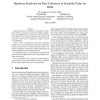Free Online Productivity Tools
i2Speak
i2Symbol
i2OCR
iTex2Img
iWeb2Print
iWeb2Shot
i2Type
iPdf2Split
iPdf2Merge
i2Bopomofo
i2Arabic
i2Style
i2Image
i2PDF
iLatex2Rtf
Sci2ools
122
click to vote
SC
2000
ACM
2000
ACM
Hardware Prediction for Data Coherency of Scientific Codes on DSM
This paper proposes a hardware mechanism for reducing coherency overhead occurring in scientific computations within DSM systems. A first phase aims at detecting, in the address space regular patterns (called streams) of coherency events (such as requests for exclusive, shared or invalidation). Once a stream is detected at a loop level, regularity of data access can be exploited at the loop level (spatial locality) but also between loops (temporal locality). We present a hardware mechanism capable of detecting and exploiting efficiently these regular patterns. Expectable benefits as well as hardware complexity are discussed and the limited drawbacks and potential overheads are exposed. For a benchmarks suite of typical scientific applications results are very promising both in terms of coherency streams and the effectiveness of our optimizations.
Related Content
| Added | 25 Aug 2010 |
| Updated | 25 Aug 2010 |
| Type | Conference |
| Year | 2000 |
| Where | SC |
| Authors | Jean-Thomas Acquaviva, William Jalby |
Comments (0)

